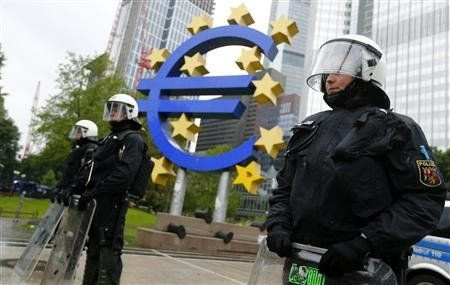Blockupy Demonstrators Clog Frankfurt Streets Demanding End To Austerity Policies They Say Help Banks, Corporations Against Working, Unemployed

Water-cannon trucks, riot police, dogs on leashes, helicopters in the sky, all monitoring the movement of angry protestors — this isn’t Cairo, or even Athens; it’s Frankfurt.
Roughly 2,500 to 3,000 angry demonstrators from a group called Blockupy marched Friday on the European Central Bank to protest austerity measures that have made deep cuts to social spending, particularly in southern-Europe areas bearing the biggest brunt of the euro zone's sovereign debt crisis.
Sign- and prop-wielding marchers blocked roads leading to the ECB and the headquarter of Deutsche Bank AG (FRA:DBK). Blockupy said on its website that more demonstrations are planned through Saturday in different locations in Europe’s de facto financial heart.
“With the blockade of the ECB, we are making the European resistance against the devastating poverty policy visible,” Blockupy said on its website. “It’s an expression of our solidarity with the people in southern Europe whose existence is threatened by the austerity programs.”
Some incidents of rock-throwing and barricade-pushing were reported by police, but for the most part the action has been peaceful.
Similar to the Occupy movement, Blockupy is a loose affiliation of European groups that oppose the policies of the so-called troika: the ECD, the European Union Commission and the International Monetary Fund. They claim that the bailout is largely aimed at securing the banking system and corporate profits at the expense of working-class Europeans, the underemployed and the unemployed.
Europe has faced a string of public backlashes in recent years to measures to reduce deficits, especially in the euro zone’s more dysfunctional economies, including Greece, Spain, Portugal and Italy.
Since 2010, demonstrations — sometimes marked by clashes with security forces — have emerged in Spain, the UK, Romania, France, the Czech Republic, Portugal, Ireland, Italy and Germany. Some of the most violent clashes have occurred in the country feeling the most economic pain: Greece.
© Copyright IBTimes 2025. All rights reserved.






















